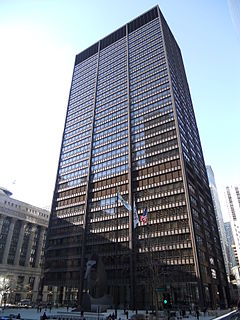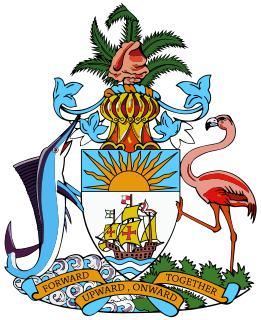In the United States, a state court has jurisdiction over disputes with some connection to a U.S. state. State courts handle the vast majority of civil and criminal cases in the United States; the United States federal courts are far smaller in terms of both personnel and caseload, and handle different types of cases.

The United States district courts are the general trial courts of the United States federal judiciary. Both civil and criminal cases are filed in district courts, each of which is a court of law, equity, and admiralty. There is a United States bankruptcy court associated with each United States district court. Each federal judicial district has at least one courthouse, and many districts have more than one. Most decisions of district courts may be appealed to the respective court of appeals of their circuit, with a small number instead being appealable to the Federal Circuit, or directly to the Supreme Court.

A county court is a court based in or with a jurisdiction covering one or more counties, which are administrative divisions within a country, not to be confused with the medieval system of county courts held by the high sheriff of each county.
The courts of England and Wales, supported administratively by Her Majesty's Courts and Tribunals Service, are the civil and criminal courts responsible for the administration of justice in England and Wales.

The term magistrate is used in a variety of systems of governments and laws to refer to a civilian officer who administers the law. In ancient Rome, a magistratus was one of the highest ranking government officers, and possessed both judicial and executive powers. In other parts of the world, such as China, a magistrate was responsible for administration over a particular geographic area. Today, in some jurisdictions, a magistrate is a judicial officer who hears cases in a lower court, and typically deals with more minor or preliminary matters. In other jurisdictions, magistrates may be volunteers without formal legal training who perform a judicial role with regard to minor matters.

District courts are a category of courts which exists in several nations, some call them "small case court" usually as the lowest level of the hierarchy. These include:

The Court of Appeals of Maryland is the supreme court of the U.S. state of Maryland. The court, which is composed of one chief judge and six associate judges, meets in the Robert C. Murphy Courts of Appeal Building in the state capital, Annapolis. The term of the Court begins the second Monday of September. The Court is unique among American courts in that the judges wear red robes. The Maryland Court of Appeals joins the New York Court of Appeals in being the only two state highest courts to bear the name "Court of Appeals" rather than "Supreme Court".

The government of Maryland is conducted according to the Maryland Constitution. The United States is a federation; consequently, the government of Maryland, like the other 49 state governments, has exclusive authority over matters that lie entirely within the state's borders, except as limited by the Constitution of the United States.

The High Court of the Republic of Singapore is the lower division of the Supreme Court of Singapore, the upper being the Court of Appeal. It consists of the Chief Justice of Singapore and the Judges of the High Court. Judicial Commissioners are often appointed to assist with the Court's caseload. There are two specialist commercial courts, the Admiralty Court and the Intellectual Property Court, and a number of judges are designated to hear arbitration-related matters. In 2015, the Singapore International Commercial Court was established as part of the Supreme Court of Singapore, and is a division of the High Court. The seat of the High Court is the Supreme Court Building.

The High Court of New Zealand is the superior court of New Zealand. It has general jurisdiction and responsibility, under the Senior Courts Act 2016, as well as the High Court Rules 2016, for the administration of justice throughout New Zealand. There are 18 High Court locations throughout New Zealand, plus one stand-alone registry.
The Circuit Court of Ireland is an intermediate level court of local and limited jurisdiction which hears both civil and criminal matters. On the criminal side the Circuit Court hears criminal matters tried on indictment with a judge and jury, except for certain serious crimes which are tried in either the Central Criminal Court or the Special Criminal Court. On the civil side the Circuit Court has a considerable parallel jurisdiction — including equitable remedies — with the High Court but normally cannot award damages of more than €75,000. The Circuit Court also hears de novo appeals from the District Court in both civil and criminal matters.

The Oregon Judicial Department (OJD) is the judicial branch of government of the state of Oregon in the United States. The chief executive of the branch is the Chief Justice of the Oregon Supreme Court. Oregon’s judiciary consists primarily of four different courts: the Oregon Supreme Court, the Oregon Tax Court, the Oregon Court of Appeals, and the Oregon circuit courts. Additionally, the OJD includes the Council on Court Procedures, the Oregon State Bar, Commission on Judicial Fitness and Disability, and the Public Defense Services Commission. Employees of the court are the largest non-union group among state workers.

The District Court of New Zealand is the primary court of first instance of New Zealand. There are 59 District Court locations throughout New Zealand. The court hears civil claims of up to $350,000 and most criminal cases. It is governed by the District Court Act 2016, which replaced the earlier District Courts Act 1947 as well as the District Court Rules which are periodically revised by the Rules Committee.
A probate court is a court that has competence in a jurisdiction to deal with matters of probate and the administration of estates. In some jurisdictions, such courts may be referred to as Orphans' Courts Maryland, or courts of ordinary. In some jurisdictions probate court functions are performed by a chancery court or another court of equity, or as a part or division of another court.

The Circuit Court of Cook County is the largest of the 24 judicial circuits in Illinois as well as one of the largest unified court systems in the United States — second only in size to the Superior Court of Los Angeles County since that court merged with other courts in 1998.
The Circuit Courts of Maryland are the state trial courts of general jurisdiction in Maryland. They are Maryland's highest courts of record exercising original jurisdiction at law and in equity in all civil and criminal matters, and have such additional powers and jurisdiction as conferred by the Maryland Constitution of 1867 as amended, or by law. The Circuit Courts also preside over divorce and most family law matters. Probate and estate matters are handled by a separate Orphans' Court. The Circuit Courts are the only Maryland state courts empowered to conduct jury trials.
The Rhode Island Superior Court is the state trial court of general jurisdiction in Rhode Island.

The High Court of Justice in London, known properly as Her Majesty’s High Court of Justice in England, together with the Court of Appeal and the Crown Court, are the Senior Courts of England and Wales. Its name is abbreviated as EWHC for legal citation purposes.

The basis of the Bahamian Law and legal system lies within the English Common Law tradition. Justices of the Supreme Court, Registrars and Magistrates are all appointed by The Governor-General acting on the advice of the Judicial and Legal Service Commission, which is composed of five individuals who are headed by the Chief Justice as their chairman. The Chief Justice and the Justices of the Court of Appeal, including the President, are appointed by the Governor-General on the recommendation of the Prime Minister after consultation with the Leader of the Opposition. Once appointed, the salaries and other terms of appointment of the Chief Justice, Justices of Appeal and Justices of the Supreme Court cannot be altered to their disadvantage. Justices of the Supreme Court can serve until the age of 65 years and, where agreed among the judge, the Prime Minister and the Leader of the Opposition, may serve until the age of 67. Justices of Appeal can serve until the age of 68 years and, where agreed among the judge, the Prime Minister and the Leader of the Opposition, may serve until the age of 70 years. The law of The Bahamas makes provisions for the appointment of 12 Justices to the Bench of the Supreme Court, inclusive of the Chief Justice, and for five Justices of the Court of Appeal, inclusive of the President. The Chief Justice, as Head of the Judiciary, is an ex officio member of the Court of Appeal, but only sits at the invitation of the President.
The Judiciary of Virginia is defined under the Constitution and law of Virginia and is composed of the Supreme Court of Virginia and subordinate courts, including the Court of Appeals, the Circuit Courts, and the General District Courts. Its administration is headed by the Chief Justice of the Supreme Court, the Judicial Council, the Committee on District Courts, the Judicial Conferences, the Judicial Inquiry and Review Commission, and various other offices and officers.















